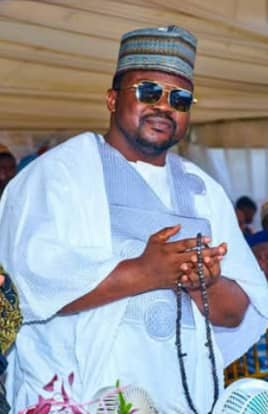society
EDITORIAL: Generational dissonance or Prejudice? Seyi Tinubu and The Ignorance of Abati by Politics Nigeria
Published
1 year agoon

EDITORIAL: Generational dissonance or Prejudice? Seyi Tinubu and The Ignorance of Abati
by
Politics Nigeria
When the two daughters of former United States’ President Bush threw a lavish party at the height of election campaigns in the early 2000s, many commentators in the United States were irked by the development. Earlier in 2001, President Bush’s then 19-year-old twin daughters, Jenna and Barbara, had been cited by Texas authorities for alcohol violations at a popular Austin restaurant.
Jenna, police said at the time, even tried to use someone else’s driver’s license to order a drink.
The condemnation and outrage that greeted that development didn’t only create buzz in the United States, but it was felt all around the world, with multiple debates on the public conducts expected of children of presidents and other powerful people around the world.
The general consensus at the time was that children of Presidents and other powerful people must conduct themselves in the most honorable means possible, while also keying into the dreams of their influential parents and being useful to society.
It’s in that light that the recent attack on Seyi Tinubu—entrepreneur, youth leader and son of President Bola Tinubu –—appears grossly unfair, if not out-rightly misplaced.
In a recent programme on television, media personality and ARISE TV anchor, Reuben Abati, took a swipe at President Tinubu’s sons, Seyi and Yinka, for following him to Qatar for a state visit. Abati, a former media aide to ex-president Goodluck Jonathan, went personal in his attack and reduced the industry of young men to partisan politics.
Hear him: “May we begin to ask what the President’s children do for a living? I mean, by the time I was their age I was doing something concrete. I got a PhD at 24. I wasn’t depending on any father. People must get to a stage in their lives when they hold themselves together.
“I don’t want adults behaving like invalids, hanging around just because your father is in a position….all these children of privileged people over do it…and these are boys that would probably have wives at home…some of these girls, what they go through is very embarrassing. You can’t have a husband that is just hanging around,” he said.
The attempt to ridicule Seyi Tinubu’s efforts and track record in the business environment in Nigeria isn’t only unfair and misleading; it’s disappointing that such is coming from a well-read and deeply knowledgeable anchor.
While some may argue that some protocol issues need to be corrected in terms of travels and how the president’s sons are introduced at international fora, it is grossly inaccurate to reduce the industry of young men building businesses in Nigeria and contributing to youth development to the mere fact of their father being president or to say that members of first families should not be recognized at the arrival of their world leader parent in another country. Donald Trump’s entire family stood on the specially reserved balcony whilst he and Melania were being received in London by the late queen, and Chelsea Clinton is famous for her photo with Bill Clinton and Hillary when the Queen was by their car with them. I also recall Bush coming to Nigeria with his daughter.
But like I said, we must be careful not to sully hardworking persons for the simple crime that their father is a President. Not even when these young men, particularly Seyi Tinubu, have made enormous impact in business long before their father contested for presidential elections.
For the sake of those who may be misled by such careless generalization, it is pertinent to set the record straight per the misrepresentation contained in Abati’s diatribe.
Seyi Tinubu is a serial entrepreneur and the CEO and Founder of Loatsad Promomedia Ltd, an outdoor advertising company with notable Nigerian leading blue chip and multinational companies as part of its clients. Due to several years of hardwork and resilience in building a successful brands, Seyi is highly sought after for his sound legal experience and deep knowledge of youth demographics and international business transactions.
Since opening Loatsad Promomedia ten years ago even till now after parting ways with his co-founder, Derenle, Seyi has overseen thousands of completed advertising transactions worth billions in transaction value. In 2020, in recognition of his industry and business acumen, he was inducted into the Institute of public resources management and politics in Ghana. In 2019, he was crowned the Ecowas youth Ambassador for Entrepreneurship and youth development and he also won the peace legend award as the Entrepreneur of the year. His company was also one of the few selected amongst thousands of SMEs in Nigeria to win the prestigious fastest growing company Award by Businessday in 2018.
Seyi has been at the tiller of the companies’ merger with Promomedia back in 2016, which saw the company opening up its portfolio of services by incorporating digital advertising. The company has since taken strides in defining its position in the out of Home Advertising sector with its acquisition of E-motion Advertising Ltd, a leading advertising firm.
Defining his place as a disruptor, serial entrepreneur and youth advocate, he has shown an unwavering commitment to ensuring positive change in Nigeria and empowering Nigeria’s millennial demographic to achieve their potential through entrepreneurship development.
It is to nurture that dream that he founded the Noella Tinubu Foundation in 2018, which helps to build capacity, support the vulnerable, and transform the lives of marginalized women, children/young adults and the elderly in specific communities by providing lasting solutions. The foundation works with experts in relevant fields to champion their causes, whilst looking to the future and working to keep the momentums going through innovative solutions.
The Foundation was founded in partnership with Layal Tinubu, Seyi’s wife and they work with dedicated network of partners to develop and execute impactful initiatives that address various national challenges.
Seyi is equally passionate about foreign investment and privatization, information technology & (advertising) outdoor and digital, human resources, and that explains his passion to deploy his expertise to ensure that his father succeeds in such key areas. As a testament to this, he has attended numerous local and international business summits including the Lagos Small Business Summit held in 2019, SDG summit in Ghana, among others.
For his efforts, he was inducted into the Class of 2018 Hall of Fame at the Nigerian Stock Exchange; was featured in The Business Year publication and his insightful thoughts on business growth published for the benefit of readers.
In the same 2018, his company was named as one of the top 1000 fastest growing SMEs in Nigeria by BusinessDay newspaper.
For the objective-minded members of the public, what’s striking is that ALL of these accomplishments were attained nearly SEVERAL years before Seyi Tinubu’s father became president and more than a decade after he left office as Lagos state governor.
So it remains disingenuous and grossly inaccurate to reduce such level of dedication to business growth, industry, resilience and passion for societal development to the mere fact of Seyi Tinubu’s father being the president.
“What is the son but an extension of the father?” quipped Frank Herbert. There isn’t any better reflection of this reality than how Seyi has shown doggedness by following the footsteps of his father, Asiwaju Bola Tinubu.
Without doubt, Dr Abati’s Tirade on “what the President’s children do for a living” is rooted in ignorance of happenings within the fast-growing business and digital technology spaces in Nigeria and beyond, where Seyi Tinubu has remained a key player and influential source of inspiration for millions of young people.
EDITORIAL: Generational dissonance or Prejudice? Seyi Tinubu and The Ignorance of Abati
Related
Sahara weekly online is published by First Sahara weekly international. contact saharaweekly@yahoo.com

society
From Emilokan to Emergency: The Tragedy of Tinubu’s Unprepared Presidency”
Published
43 minutes agoon
April 19, 2025
“From Emilokan to Emergency: The Tragedy of Tinubu’s Unprepared Presidency”
By George O. Sylvester
When Bola Ahmed Tinubu thundered “Emilokan”; Yoruba for “It’s my turn”, during his now-infamous declaration of presidential ambition, it resonated not as a call to serve, but as a personal entitlement. The former Lagos governor, long regarded as a political tactician lurking in the shadows of power since the early 1990s, assumed the presidency in 2023 with the self-proclaimed aura of inevitability. But barely a year into his tenure, it has become glaringly evident: Bola Ahmed Tinubu was profoundly unprepared for the very office he schemed, plotted, and politicked for over three decades to attain.
This is no longer just political opinion, it is the lived reality of over 200 million Nigerians now burdened by escalating poverty, insecurity, and economic hopelessness. The man who once strutted the corridors of Bourdillon like a kingmaker has proven to be a disaster in office, leading with a detachment so severe it borders on abdication.
A President Abroad: Governance by Absence
Since assuming office, President Tinubu has spent an estimated 70% of his leadership days in Europe or elsewhere outside Nigeria. From medical trips cloaked as “private visits” to diplomatic shuttles that yield no visible results, his preference for foreign soil has turned Nigeria’s highest office into a revolving door of absenteeism.
Economic analyst Dr. Ayo Teriba did not mince words when he recently remarked, “We are in a leadership vacuum. The ship is rudderless while the captain watches from a distant shore.”
This chronic absence undermines not only the operational machinery of governance but the symbolism of leadership. In a nation grappling with multidimensional poverty, a spiraling exchange rate, and unprecedented inflation, the least citizens deserve is a president who is physically and mentally present.
Policy Catastrophe: A Clueless Economic Agenda
Tinubu’s first act as president was the abrupt removal of fuel subsidy, an economically necessary but grossly mishandled decision. Implemented without a cushion or plan, it triggered a tsunami of inflation that devastated the already impoverished populace. Transportation costs doubled overnight. Food prices soared. Businesses collapsed under the weight of erratic fuel supply and unaffordable diesel.
Renowned economist and former CBN Deputy Governor Kingsley Moghalu summed it up sharply:
“Sound economic reform is not about bravado. It’s about sequencing, communication, and empathy. None of these were present in the Tinubu administration’s fuel subsidy removal.”
The naira, which was ₦460 to $1 in May 2023, has plummeted to over ₦1,400 within months, despite empty promises of “market reforms.” The CBN remains directionless, mired in confusion and panic-driven policies. Inflation now stands at over 33%, with food inflation nearing 40%, according to the National Bureau of Statistics (NBS).
Tinubuomics: Tax the Poor, Enrich the Powerful
Under Tinubu, fiscal policy has turned predatory. New taxes and levies are imposed almost monthly, squeezing an already overburdened informal sector. Yet the same administration refuses to cut government waste, reduce the bloated cost of governance, or hold political elites accountable.
“Tinubu’s economic strategy is a tale of punishing the poor while protecting the powerful,” said Professor Pat Utomi. “The government has become a collection agency for the elite.”
Instead of addressing structural issues, the administration obsesses over optics, renaming airports, appointing redundant aides, and holding international meetings that produce no real investment or outcomes.
Security in Shambles: A Nation Under Siege
The security situation remains dire. Boko Haram, bandits, unknown gunmen, and kidnappers continue to run riot. In Plateau, Zamfara, Kaduna, and even the FCT, citizens live in fear. There is no sense of urgency or coherent national security policy from the presidency.
Just weeks ago, over 300 schoolchildren were kidnapped in Kaduna in one swoop, yet Tinubu issued no national address. Former National Security Adviser Col. Abubakar Dangiwa (rtd) lamented, “There is no soul in this leadership. They do not feel the pain of the people.”
The Tinubu Myth: A Manufactured Legacy
Much of Tinubu’s rise was built on the myth of his “Lagos success.” But Lagos is not a model of good governance, it is a privatized state run by cronies. Its development has been largely driven by federal allocation and private sector investment, not Tinubu’s genius. In fact, Lagos ranks low in transparency, urban planning, and public education outcomes compared to other African megacities.
“What we see in Lagos is state capture, not development,” noted Dr. Chidi Odinkalu, former Chairman of the National Human Rights Commission.
Cronyism and Nepotism: The Emilokan Manifesto in Action
Tinubu’s appointments so far reflect not merit but patronage. Political loyalists, ex-governors with corruption cases, and family members dominate the corridors of power. From the Central Bank to the Customs, Tinubu’s cronies are embedded, deepening Nigeria’s institutional decay.
It’s not “Renewed Hope” na 
The Global Image Crisis
On the international stage, Nigeria’s reputation is now synonymous with instability. Investor confidence is at an all-time low. Global brands are exiting Nigeria, Procter & Gamble, GlaxoSmithKline, and others, citing policy inconsistency and economic chaos.
“Nigeria under Tinubu is not a place for business. It is a place for survival,” said Dr. Obadiah Mailafia before his untimely death. His words remain prophetic.
From Hope to Hopelessness: The Nigerian Mood
Ask the average Nigerian today what they think about the Tinubu administration, and you’ll be met with silence, sarcasm, or outright rage. The streets no longer chant “Emilokan”; they mutter “Wahala no dey finish.” The illusion has shattered. The so-called national messiah has become a symbol of elite entitlement and failed leadership.
As Nobel Laureate Wole Soyinka once warned, “The man dies in all who keep silent in the face of tyranny.” It is time Nigerians spoke loudly against this deception masquerading as governance.
In conclusion: A Call for Reckoning
Tinubu’s presidency is not just a failure, it is a betrayal. A betrayal of the youth who voted for change. A betrayal of the suffering poor. A betrayal of democratic ideals, and stolen mandate. History will not remember Bola Tinubu as a reformer. It will remember him as a man who schemed for power but squandered it in spectacular fashion.
There is still time for correction, but not under this leadership. Nigeria deserves more than recycled ambition. We need courage, vision, and competence.
Until then, the nation waits. And suffers.
Related
society
Good Friday: Ambassador Ajadi’s Bold Call for Nigeria to Embrace Christ’s Sacrifice to Overcome Corruption and Injustice
Published
14 hours agoon
April 18, 2025
Good Friday: Ambassador Ajadi’s Bold Call for Nigeria to Embrace Christ’s Sacrifice to Overcome Corruption and Injustice
By Ibrahim Kegbegbe
As Christians across the globe commemorate Good Friday today, April 18, 2025—a sacred day marking the crucifixion of Jesus Christ—Ambassador Olufemi Ajadi Oguntoyinbo, the Chairman and CEO of Bullion Records, has extended a heartfelt message of reflection, urging Nigerians and the international community to draw enduring lessons from Christ’s ultimate sacrifice.
In a statement made available to The Merit Newspaper and other media platforms, Ambassador Ajadi described Good Friday as more than a religious commemoration. According to him, it is a day of deep moral introspection and a call to purposeful sacrifice, love, and justice—principles sorely needed in Nigeria’s current socio-political landscape.
“Good Friday reminds us of the depth of love and sacrifice that Christ showed to humanity. He gave His life not for a select few, but for all mankind—regardless of race, tribe, or religion. It is this level of selflessness that our leaders, especially at the federal level, must emulate in service to the people,” Ajadi stated.
He noted that at a time when many Nigerians are grappling with inflation, unemployment, and insecurity, the message of Good Friday should challenge those in authority to govern with compassion, humility, and a genuine heart for service.
“Christ didn’t die for Himself. He died for the weak, the poor, and the oppressed. That lesson should not be lost on those in power today. The federal government must place the needs of the suffering masses above personal or political interests,” Ajadi emphasized.
The music executive and philanthropist also appealed to citizens not to lose hope but to remain committed to doing good in their communities. “If every Nigerian—Muslim, Christian, or traditional believer—embodies the sacrificial spirit of Christ by showing love, tolerance, and respect to others, we will rebuild a nation we can all be proud of,” he added.
Reflecting on his own contributions through entertainment, Ajadi revealed that Bullion Records remains committed to producing music that uplifts, unites, and educates. “As we reflect on today’s spiritual significance, let us also appreciate the role of art and culture in healing society. Our artiste, Harcher, will be releasing more inspirational tracks aimed at promoting peace and national consciousness.”
Good Friday, observed during Holy Week, is a solemn reminder in the Christian calendar of the pain and price of redemption. Across Nigeria and the world, it is marked by church services, fasting, and prayers—particularly emphasizing forgiveness, humility, and hope in the face of adversity.
Ajadi went further by calling on both the government and citizens to renew their commitment to nation-building. “The resurrection story teaches us that even after pain, there can be restoration. Let us rise from this moment of hardship with a renewed resolve to serve one another, speak truth, and live in love,” he said.
This call from Ambassador Ajadi, a respected entrepreneur and patriot known for his vocal support for youth empowerment and national development, comes at a time when Nigeria is searching for healing, unity, and visionary leadership.
Related
society
There Was a Country: Chinua Achebe’s Testament of Nigeria’s Lost Promise
Published
22 hours agoon
April 18, 2025
There Was a Country: Chinua Achebe’s Testament of Nigeria’s Lost Promise
Related
Trending
-

 Business6 months ago
Business6 months agoComprehensive Media Audit Shows Flutterwave, MTN Nigeria, and Bolt Outpacing Competitors in Media Engagement
-

 celebrity radar - gossips6 months ago
celebrity radar - gossips6 months agoHow Deji Adeyanju Secured The Release Of Speed Darlington
-

 Politics6 months ago
Politics6 months agoMy best is yet to come’ As Ambassador Adesina ‘Lanre Ogunsola affirmed at the APC APEX body, Obafemi Owode Local Government
-

 Entertainment4 months ago
Entertainment4 months agoAliu Gafar delivers stellar performance as Esusu in Femi Adebayo’s Seven Doors















